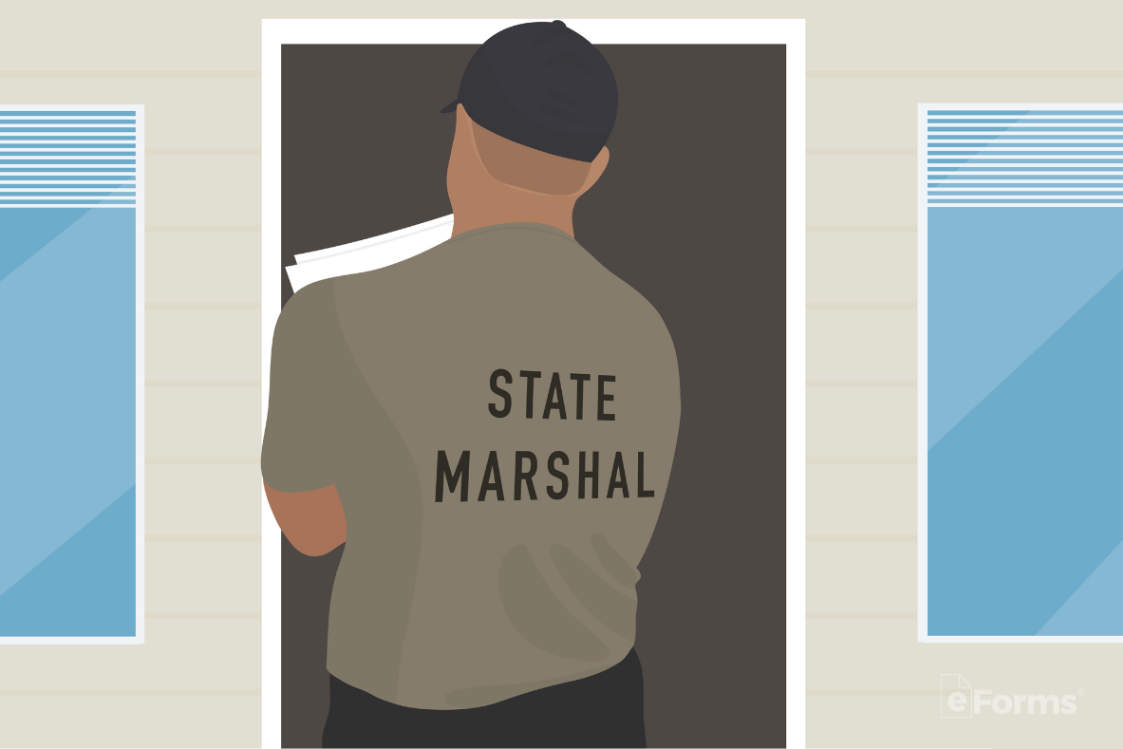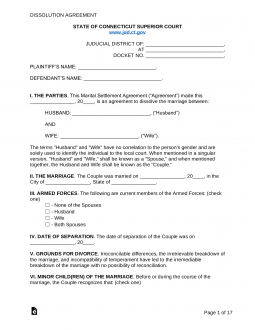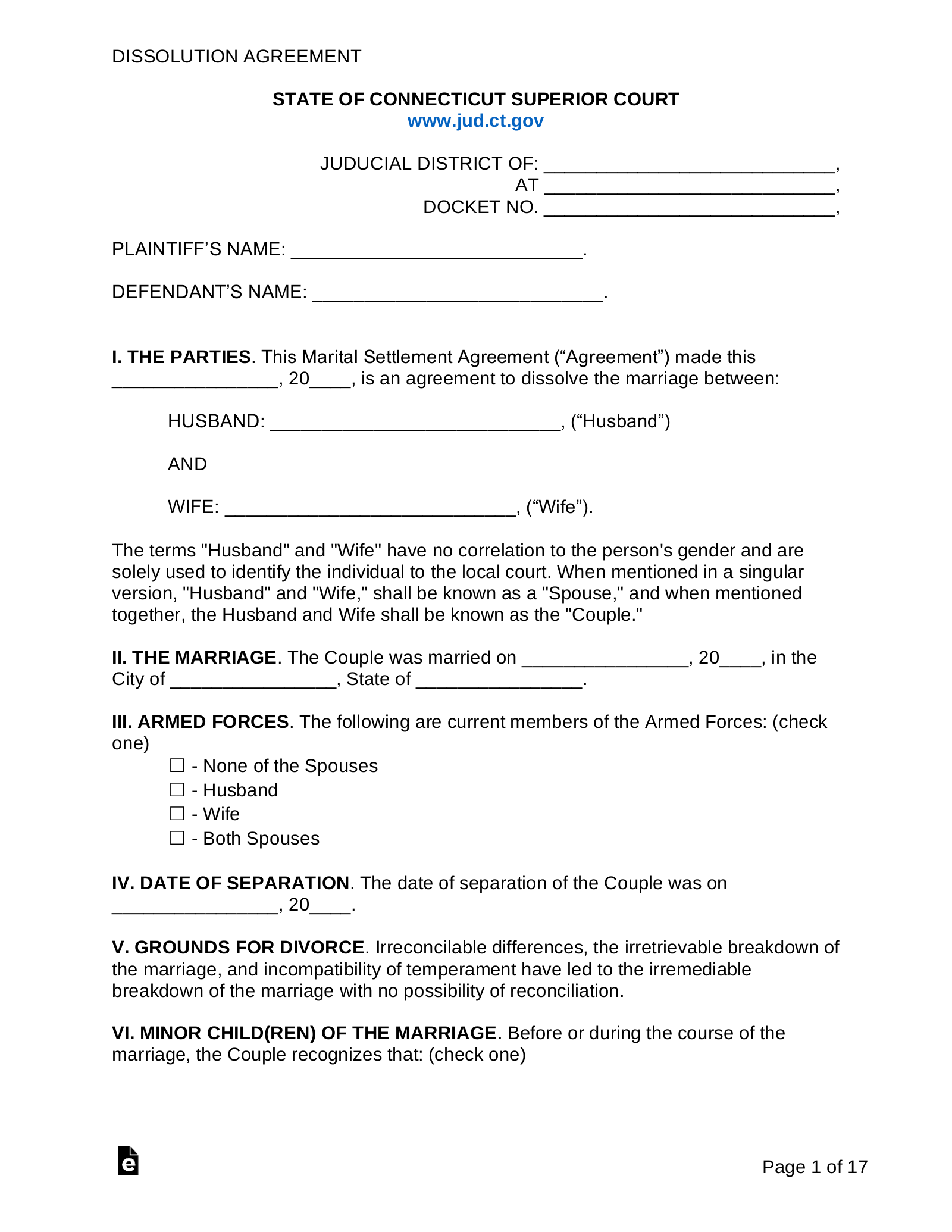Updated August 31, 2023
A Connecticut marital settlement agreement is a document that defines the decisions made by spouses as it relates to their rights and obligations after divorce. Couples will commonly draft a settlement agreement to establish terms for child support, child custody, alimony, and the division of property and debts. To ensure the fairness of wage garnishments, the spouses must reveal their assets and all income sources. Couples seeking to obtain an uncontested divorce judgment must submit the settlement agreement to the court where their divorce complaint was filed. After a divorce is granted, the settlement terms are enforceable by court order. Therefore, if either spouse fails to honor their obligations, they may be held in contempt or face other penalties imposed by the court.
Table of Contents |
Divorce Laws
Statutes – Chapter 815j – Dissolution of Marriage, Legal Separation and Annulment
Alimony (§ 46b-82) – In deciding whether to award alimony, and the duration and amount of support, the court will consider the following:
- The evidence given by each party;
- How long the marriage has lasted;
- The reason for divorce;
- The property awarded to each spouse by the court;
- Each spouse’s age and health;
- Each spouse’s occupation, station, income sources, earning capacity, practical skills, employability, education, estate, and needs; and
- With respect to a parent who has been granted custody of a child, whether it is feasible and desirable to secure employment.
Alimony Calculator – calculators.law
Child Support (§ 46b-84) – Connecticut courts adhere to these guidelines when determining the child support obligations of a spouse.
Child Support Calculator – alllaw.com
Division of Property (§ 46b-81) – Connecticut uses equitable distribution to divide marital property. This means that any asset or debt accumulated by the couple while married will be split fairly, but not always equally.
Grounds for Divorce (§ 46b-40) – The court may award a divorce if they find that one (1) of the following grounds have been met:
-
The marriage has broken down and cannot be restored;
- The spouses have lived apart due to incompatibility for a continuous duration of eighteen (18) months or more prior to the receipt of the divorce complaint, and reconciliation is unlikely;
- Adultery;
- The marriage was formed fraudulently;
- Intentional desertion for one (1) year with a complete failure to maintain marital duty;
- Seven (7) years’ absence during which no contact has been made by the absent spouse;
- Intolerable cruelty;
- A sentence to life imprisonment;
- Commission of any infamous crime involving a spouse’s violation of conjugal duty for which the punishment is imprisonment for one (1) year or longer;
- Confinement in a hospital or other institution due to mental illness for an accumulated duration of five (5) years within a period of six (6) years immediately preceding the filing date of the divorce complaint.
Interim Support (§ 46b-83) – At any time while the divorce case is pending, a spouse may be awarded temporary support known as “pendente lite.” Included in the pendente lite may be the exclusive use of either spouse’s residential property.
Residency (§ 46b-44) – A divorce will not be granted unless either spouse has maintained residency in Connecticut for twelve (12) months, or either spouse resided in Connecticut at the start of the marriage and has returned before the filing of the divorce complaint with the intention of staying. The residency requirements do not apply if the reason for the divorce arose after either spouse moved to Connecticut.
Divorce Forms
- Where to File – Superior Court Clerk’s Office
- Filing Fee – $350
- How Long Does it Take? Thirty (30) to ninety (90) days (source: 3stepdivorce.com)
Uncontested Divorce with No Children:
- Agreement – Nonadversarial Divorce (Dissolution of Marriage) (JD-FM-243)
- Answer (JD-FM-160)
- Appearance (JD-CL-12)
- Application For Waiver Of Fees/ Appointment Of Counsel Family (JD-FM-75)
- Case Management Agreement/Order (JD-FM-163)
- Certification of Notice In Family Cases (Public Assistance) (JD-FM-175)
- Certification of Waiver of Service of Process – Divorce, Legal Separation and Annulment (JD-FM-249)
- Dissolution Agreement (JD-FM-172)
- Dissolution of Marriage (Divorce) Judgment (JD-FM-177)
- Divorce Complaint/Cross Complaint (JD-FM-159)
- Financial Affidavit (JD-FM-6-LONG)
- Financial Affidavit (JD-FM-6-SHORT)
- Joint Petition – Nonadversarial Divorce (Dissolution of Marriage (JD-FM-242)
- Motion to Waive Statutory Time Period – Divorce or Legal Separation (JD-FM-247)
- Notice of Automatic Court Orders (JD-FM-158)
- Notice of Automatic Court Orders – Nonadversarial Divorce (JD-FM-260)
- Return of Service (not available online)
- Summons Family Actions (JD-FM-3)
Uncontested Divorce With Children:
- Agreement – Nonadversarial Divorce (Dissolution of Marriage) (JD-FM-243)
- Affidavit Concerning Children (JD-FM-164)
- Answer (JD-FM-160)
- Appearance (JD-CL-12)
- Application For Waiver Of Fees/ Appointment Of Counsel Family (JD-FM-75)
- Case Management Agreement/Order (JD-FM-163)
- Certification of Notice In Family Cases (Public Assistance) (JD-FM-175)
- Certification of Waiver of Service of Process – Divorce, Legal Separation and Annulment (JD-FM-249)
- Child Support Guidelines Worksheet (CCSG -1)
- Dissolution Agreement (JD-FM-172)
- Dissolution of Marriage (Divorce) Judgment (JD-FM-177)
- Divorce Complaint/Cross Complaint (JD-FM-159)
- Financial Affidavit (JD-FM-6-LONG)
- Financial Affidavit (JD-FM-6-SHORT)
- Joint Petition – Nonadversarial Divorce (Dissolution of Marriage (JD-FM-242)
- Motion to Waive Statutory Time Period – Divorce or Legal Separation (JD-FM-247)
- Notice of Automatic Court Orders (JD-FM-158)
- Notice of Automatic Court Orders – Nonadversarial Divorce (JD-FM-260)
- Parenting Education Program – Order, Certificate and Results (JD-FM-149)
- Return of Service (not available online)
- Summons Family Actions (JD-FM-3)
Before advancing to the instructions below, the divorce filer should see if they meet the qualifications for the state’s simplified filing process.
How to File for Divorce in Connecticut (10 steps)
- Complete the Divorce Forms
- File for Divorce
- Serve Papers on Other Spouse
- Marital Settlement Agreement
- Case Management Agreement
- Appearance and Answer
- Financial Affidavits
- Requirements for Parents
- Court Hearing
- Name Change
1. Complete the Divorce Forms

To initiate the filing process for an uncontested divorce, either of the spouses will need to fill out a Divorce Complaint/Cross Complaint and Summons. Attached to the complaint must be a Notice of Automatic Court Orders and, if the spouses have minor children, an Affidavit Concerning Children. If temporary alimony or support is needed while the case is pending, the filing spouse should also complete the Motion for Orders Before Judgment (Pendente Lite) in Family Cases.
Note: The divorce filer (the “plaintiff”) should make photocopies of all documents used throughout the filing process.
2. File for Divorce
The next step requires the plaintiff to file their paperwork at a local clerk’s office and pay the $350 filing fee. If they cannot afford the fee, an exemption may be requested with an Application For Waiver Of Fees (must be signed in front of a court clerk). The clerk will review the documents, sign the Summons, and return the forms to the plaintiff.
- There is a ninety (90) day waiting period between the initial filing date and the final judgment date. The couple can ask the court to waive the waiting period by filing a Motion to Waive Statutory Time Period (must be signed in the presence of a notary public or authorized court member).
3. Serve Papers on Other Spouse

The plaintiff must provide the original Summons, Divorce Complaint, and Notice of Automatic Court Orders to a state marshal in the district where the other spouse (the “defendant”) lives or works. For a fee, the state marshal will serve the court papers on the defendant. Service must take place at least twelve (12) days before the return date stated on the Divorce Complaint.
- After serving the defendant, the state marshal will either return the original documents to the plaintiff or file them directly with the court. The state marshal will then complete a Return of Service, which must be included with the original documents and filed with the court at least six (6) days before the return date.
Note: The service requirement may be waived if the defendant agrees to file an Appearance and a Certification of Waiver of Service of Process (must be signed in front of a notary public or court clerk).
4. Marital Settlement Agreement
When attempting to obtain an uncontested divorce judgment, it must be evident that the spouses agree on all issues concerning their separation, such as alimony, custody, child support, and the division of property and debts. The couple should negotiate the settlement terms and, once an agreement has been reached, record the terms in a Marital Settlement Agreement or in the Superior Court’s Dissolution Agreement.
5. Case Management Agreement
After the spouses agree on all divorce-related issues, they must complete a Case Management Agreement/Order and file it with the court on or before the case management date (this date can be found in the Notice of Automatic Court Orders). The parties must then schedule a hearing date for their case.
6. Appearance and Answer
If not filed already, the defendant will need to complete an Appearance and file it with a clerk no later than two (2) days after the return date. The defendant has the option of filing an Answer to tell the court whether they agree or disagree with statements in the petitioner’s divorce complaint. It should be noted that in an uncontested divorce case, the defendant and petitioner must agree on all divorce-related matters.
7. Financial Affidavits

Each spouse will need to complete a financial affidavit to disclose their income, expenses, assets, and debts. The affidavit must be signed in front of a notary or authorized court member and filed with the court between five (5) and thirty (30) days before the hearing date. Additionally, a copy of the affidavit must be delivered to the other spouse.
- Financial Affidavit – Long
- For spouses whose gross annual income and total net assets, whether combined or separate, are greater than $75,000.
- Financial Affidavit – Short
- For spouses whose gross annual income is less than $75,000 and total net assets are less than $75,000.
8. Requirements for Parents
Parents of minor children must attend a parenting education program within sixty (60) days after filing for divorce (see list of approved programs). Each parent will need to give the program provider a Parenting Education Program Order, Certificate and Results and payment for the $125 fee, unless a fee exemption was previously granted. Lastly, parents must complete a Child Support Guidelines Worksheet to determine their child support obligations.
9. Court Hearing
Each spouse should deliver copies of their divorce paperwork to the other before appearing in court. Another set of photocopies must be prepared and brought to court on the hearing date. During the hearing, a judge will review the case and make a judgment. If a divorce is granted, each party must fill out a Dissolution of Marriage (Divorce) Judgment and file it within sixty (60) days of the judgment date.
10. Name Change
If a name change was requested during the divorce proceedings, the requesting party must obtain a certified copy of the Dissolution of Marriage (Divorce) Judgment. The certified copy serves as legal proof of the name change and may be used to update their personal accounts and identification cards.
Nonadversarial Divorce
Connecticut offers a simplified filing process known as “Nonadversarial Divorce” by which the spouses can receive a divorce within thirty-five (35) days without having to appear in court. To be eligible for a nonadversarial divorce, the parties must meet the following criteria:
- The marriage has lasted nine (9) years or less;
- Neither spouse is pregnant;
- The spouses had no children together before or during the marriage;
- The spouses have no title or interest in real property;
- The total value of property owned by the spouses is less than $80,000;
- The spouses have no defined benefit pension plan;
- Neither spouse is pending bankruptcy;
- There is no other divorce case pending; and
- Neither spouse has a restraining or protective order against the other.
If the above criteria are met, the spouses may file the below forms with a clerk of the Superior Court. The clerk will charge the couple a $185 filing fee. If they can’t afford the court fee, an exemption may be requested by filing an Application For Waiver Of Fees.
- Joint Petition – Nonadversarial Divorce (Dissolution of Marriage)
- Must be signed in front of a notary public or an authorized court member.
- Financial Affidavit – Long or Financial Affidavit – Short
- Each spouse must complete an affidavit and sign in front of a notary public or an authorized court member.
- Appearance
- One (1) form for each spouse.
- Certification of Notice In Family Cases (Public Assistance)
- Only required if either of the spouses received public assistance.
- Agreement – Nonadversarial Divorce (Dissolution of Marriage)
- Only required if the spouses want to incorporate a settlement agreement in the divorce decree.
- Notice of Automatic Court Orders – Nonadversarial Divorce
Additional steps may be required after filing the above documents. For more information, the spouses should contact a Court Service Center.


